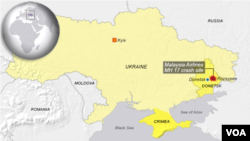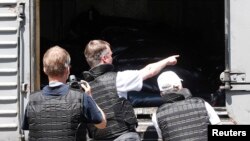Ukraine has offered to give the lead in the investigation into the downing of the Malaysian airliner last week to the Netherlands, the country that had the most citizens on board. The move appears to be aimed at convincing Russia and the rebels it supports to allow the transport of the 272 bodies found so far, most of them waiting in refrigerated rail cars in a rebel-controlled town.
“Ukrainian government is ready to transfer an international investigation to our Dutch friends," Ukrainian Prime Minister Arseniy Yatsenyuk announced during a news conference in Kyiv. "Dutch side could lead the process of investigation, together with the entire international community and Ukrainian authorities.”
The proposal appeared to be aimed at breaking a deadlock that has left the bodies stranded in an eastern Ukraine village. Russian-backed separatists who control the area have refused Ukrainian and international requests to allow the train to travel to the government-controlled city of Kharkiv, 300 kilometers away.
Yatsenyuk said 28 investigators from four countries, and three Australian diplomats, arrived in Kharkiv Monday morning to receive the bodies and arrange their transport to a forensic laboratory in Amsterdam. He said that would provide for “a more independent investigation.”
Meanwhile, three Dutch investigators have arrived at the scene of the crash.
"The storage of the bodies is of good quality," said Peter van Vliet, whose team went through the wagons dressed in surgical masks and rubber gloves, four days after the crash.
The prime minister showed anger and emotion during his briefing, and used strong language, describing the separatists as “drunks” and “bastards” and saying Russia is on the “dark side.”
“Together with the entire international community we will bring to justice everyone responsible, including the country which is behind the scene," he promised.
'Enough is enough'
Yatsenyuk said Russia is supplying, training and financing the separatists. He called on Russia to stop, saying “enough is enough,” but he said he does not expect Russia to cooperate now, after months of supporting the rebels and days of no help with the crash investigation.
Aside from the issue of the bodies, Yatsenyuk called for the handover of all evidence collected in the area where the plane went down. Some of it was collected by locally based workers from Ukraine's State Emergency Service; but other material, including the plane’s flight recorders, is believed to be in the hands of the separatists. Officials say the qualified emergency workers are doing their jobs as best they can, but their activities are controlled by the separatists.
On Monday, an angry Russian President Vladimir Putin, chafing at accusations of complicity, said others were exploiting the airliner's downing "for mercenary objectives."
The Associated Press reported Putin claimed the Kremlin was doing everything it could to enable investigators to reach the crash site.
"We can say with confidence that if fighting in eastern Ukraine had not been renewed on June 28, this tragedy would not have happened,'' Putin said, according to AP. "Nobody should or does have a right to use this tragedy for such mercenary objectives.''
Malaysia Airlines Flight 17 from Amsterdam to Kuala Lumpur went down last Thursday with 298 people on board. Western intelligence agencies say the plane was almost certainly shot down by a Russian-made anti-aircraft missile fired from a mobile launcher parked in a rebel-controlled area. They say that their sensors detected a missile launch and that three such systems were seen being driven back into Russia shortly after the attack.
In addition, militants initially boasted online about shooting down a Ukrainian military transport, but then removed the post. And the Ukrainian government has published audio recordings it says are the voices of shocked rebels arriving on the scene and finding the remains of the civilian airliner and its passengers, and reporting the fact to Russian operatives.






